Erica Vetsch's Blog, page 85
June 30, 2020
Recalculate, Reinvigorate, Restart
 by Mindy Obenhaus
by Mindy ObenhausHere we are, officially at the halfway point of 2020. It’s been one for the record books, hasn’t it? Now, this may be tough, but I’m going to ask you to look all the way back to January 1. Back when COVID wasn’t even a blip on our radar and you were looking forward to what 2020 might hold. What were your goals for this year? Go ahead, pull out that list, mental or written, and look it over. Are you able to check anything off?
I know life has been wonky, so some of the things on your list may be out of your control, but what about the rest? Are you going to throw in the towel or press on, no matter what life throws at you? Because let’s face it, there has always been and will always be obstacles. The loss of a job, illness, death of a loved one.
Mary Cate talked about procrastination and the inability to focus during these tough times in her post last week (if you missed it, you can read it here). She had a more scientific approach, but she’s a lot smarter than I am. So today I’m going to give you a laywoman’s approach to pressing on.
Recalculate – Think back to when you wrote down that goal. Was it simply a wish or were you determined to achieve it? Why were you determined? Did you have a plan of action? It’s okay to go off the map, but there comes a time when you have to get back on if you want to reach your destination. Look at where you are now and then think about where you want to be at the end of the year. Come up with a realistic plan of action and resolve to stick to it as much as possible.

Reinvigorate – Surround yourself with things that uplift and/or motivate you. Praise and worship music always lifts my spirits and helps me refocus. Bible studies or books on the craft of writing or whatever else might interest you can reinvigorate your desire and motivate you to push through. And encouraging people are always a blessing. Is there someone in your life who will encourage you to press on? Is there someone you can share your goals with, knowing that they’ll support you? If so, I’d encourage you to do that. And, of course, the ladies of Seekerville are always on the sidelines, cheering you on every step of the way. Our goal is to motivate and encourage you on your journey. Remember, you are not alone.
Pray – Sometimes the simplest things are the hardest. God gave you the desire for whatever it is you want to achieve so that He could partner with you every step of the way. Tell Him your struggles, your weaknesses and fears, knowing that He's big enough to help you overcome whatever obstacles cross your path. Claim those scriptures that promise He will never leave you nor forsake you. Hold tightly to His hand and then get ready for the ride of your life.
Don’t lose heart or give up on your goals just because the world has gone crazy. Revisit them then recalculate, reinvigorate and restart your journey.
How are your goals for 2020 shaping up? Are you staying on task or is it time to recalculate? Leave comment for a chance to win a copy of my new release, A Father's Promise. (US mailing addresses only, please)
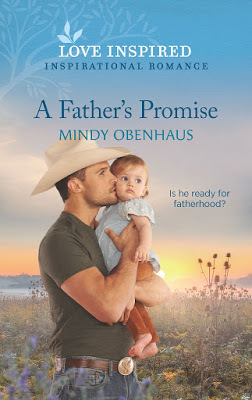
Is he ready for fatherhood?
He doesn’t think he deserves a family… But now he has a daughter.
Stunned to discover he has a child, Wes Bishop isn’t sure he’s father material. But his adorable daughter needs him, and he can’t help feeling drawn to her mother, Laurel Donovan—a woman he’s finally getting to know. But can this sudden dad overcome a past tragedy that has him convinced he’s not meant to be a husband or a father…and make a promise of forever?
 HOLT Medallion winner and three-time Carol Award finalist, She lives on a ranch in Texas with her husband, two sassy pups, countless cattle, deer and the occasional coyote, mountain lion or snake. When she’s not writing, she enjoys spending time with her grandchildren, cooking and watching copious amounts of the Hallmark Channel. Learn more at www.MindyObenhaus.com
HOLT Medallion winner and three-time Carol Award finalist, She lives on a ranch in Texas with her husband, two sassy pups, countless cattle, deer and the occasional coyote, mountain lion or snake. When she’s not writing, she enjoys spending time with her grandchildren, cooking and watching copious amounts of the Hallmark Channel. Learn more at www.MindyObenhaus.com
Published on June 30, 2020 21:00
June 28, 2020
OPEN CRITIQUE DAY for BLUE MOON MONDAY!!!!!!!
OPEN CRITIQUE DAY!!!!!
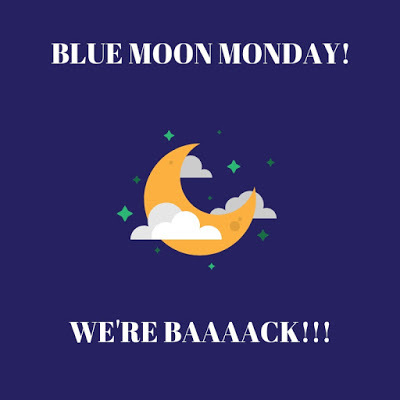
Hey, if you know the drill, then you're prepared to have some fun today...
If you don't, here's the skinny:
Once in a while we have an Open Critique Day. It's a day for you to share a blurb of your story with us and we will descend en masse and tear it to shreds.
It's what we do.
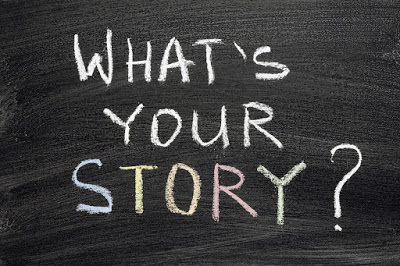
But we'll do it NICELY, so you have to look beyond the "nice" and get to the nitty gritty of the advice, then pick what you want to use... and scrap the rest.
At least temporarily scrap it, you may find yourself coming right back to that bit of advice in a month or six months on 2021...
And a light bulb clicks on and you say OH MY STARS!!!! (or an equivalent thereof) and all of a sudden you remember that criticism and/or advice and you realize this...
THIS!
Is what that author meant about organic roots or root canals or dangling modifiers or gerunds (listen, I don't know what half this stuff is, either, it's why I don't read craft books... I just write. And I read. And I copy smart people. Then I write some more.)
But that light bulb moment is huge.
So leave your opening or smidge or tagline below, whatever you'd like us to look at. Keep it to about a page... no whole chapters, please, darlings.
And let's chat how we polish, preen and persevere!
Ruthy
NOTE: The Seekers formed a group fifteen years ago, a group of fifteen authors who devoted themselves to writing and praying each other into publication and the current Seekers want to do the same for you... Publishing can be a rough business, but with love and support we can build one another into the writers we want to be!

Hey, if you know the drill, then you're prepared to have some fun today...
If you don't, here's the skinny:
Once in a while we have an Open Critique Day. It's a day for you to share a blurb of your story with us and we will descend en masse and tear it to shreds.
It's what we do.

But we'll do it NICELY, so you have to look beyond the "nice" and get to the nitty gritty of the advice, then pick what you want to use... and scrap the rest.
At least temporarily scrap it, you may find yourself coming right back to that bit of advice in a month or six months on 2021...
And a light bulb clicks on and you say OH MY STARS!!!! (or an equivalent thereof) and all of a sudden you remember that criticism and/or advice and you realize this...
THIS!
Is what that author meant about organic roots or root canals or dangling modifiers or gerunds (listen, I don't know what half this stuff is, either, it's why I don't read craft books... I just write. And I read. And I copy smart people. Then I write some more.)
But that light bulb moment is huge.
So leave your opening or smidge or tagline below, whatever you'd like us to look at. Keep it to about a page... no whole chapters, please, darlings.
And let's chat how we polish, preen and persevere!
Ruthy
NOTE: The Seekers formed a group fifteen years ago, a group of fifteen authors who devoted themselves to writing and praying each other into publication and the current Seekers want to do the same for you... Publishing can be a rough business, but with love and support we can build one another into the writers we want to be!
Published on June 28, 2020 21:01
June 27, 2020
Sunday Scripture & Prayer Requests
 Head of Christ, Antonio Correggio, 1521,
Head of Christ, Antonio Correggio, 1521,Getty Museum. [PS-US]
Jesus said to his apostles:“Whoever loves father or mother more than me is not worthy of me,and whoever loves son or daughter more than me is not worthy of me;and whoever does not take up his crossand follow after me is not worthy of me.Whoever finds his life will lose it,and whoever loses his life for my sake will find it.
"Whoever receives you receives me,and whoever receives me receives the one who sent me.Whoever receives a prophet because he is a prophetwill receive a prophet’s reward,and whoever receives a righteous manbecause he is a righteous manwill receive a righteous man’s reward.And whoever gives only a cup of cold waterto one of these little ones to drinkbecause the little one is a disciple—amen, I say to you, he will surely not lose his reward.”Matthew 10:37-42
The Seekerville bloggers are praying for YOU and for our entire blog community. If you have any special intentions that need additional prayer coverage, leave a request for prayer in the comment section below.
Please join us in praying for the United States--and the world--during this coronavirus outbreak. Also please pray for calm to be restored to our country and for peace to reign.
We are so grateful for all of you—for your friendship and your support! May the Lord bless you and your families and keep you safe.
Published on June 27, 2020 21:00
June 26, 2020
Weekend Edition

If you are not familiar with our giveaway rules, take a minute to read them here. It keeps us all happy! All winners should send their name, address, and phone number to claim prizes. Note our new email address and please send your emails to Seekerville2@gmail.com

Monday: Erica Vetsch offered insight on Rejection Letters, The Good and the Bad.
Wednesday: Cate Nolan says, "Calgon Take Me Away?" If you missed the post, go back and take a peek to find out why you might be having such a hard time concentrating on anything right now. Also check out the connected link below.
Friday: Pam Hillman equates Writing to Raising Kittens. Interesting comparison, right?

Monday: Hmmm, do we see a Blue Moon Monday? WE DO!!!!! Prepare whatever you've got for an off-the-cuff critique as we welcome another Blue Moon Monday with free critiques! Let's roll on through the weekend with a bit of spit and polish and on Monday, show us what ya' got, village people! We'll look at up to a page posted.... and you can intro it, but remember, a page should be strong enough to grab the reader... and the editor/and/or/agent!
Wednesday: We're tearing off another calendar page. July is here and Mindy Obenhaus will be back to share with us! Friday: Let's see what Friday brings :) It could be a patriotic surprise package and maybe a sharing of stories of what patriotism means to you.

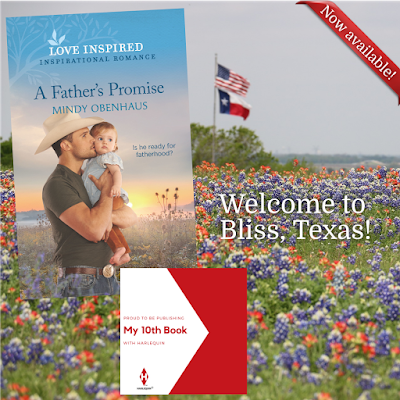 Order your copy of A Father's Promise here!
Order your copy of A Father's Promise here!Pick up Her Rocky Mountain Hope for only $1.99. Available at Amazon and Barnes & Noble!
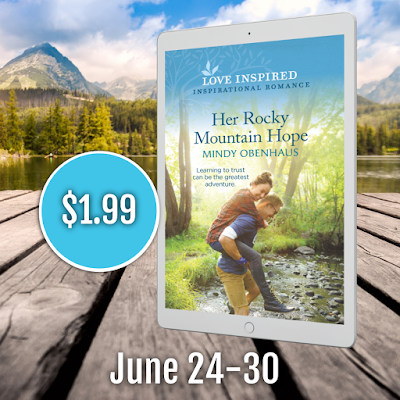

Why You Can't Concentrate Right Now by Bonnie Randall at Fiction University
The Do's and Don't's of Storytelling According to Marvel by KM Weiland at Helping Writers Become Authors
Spin That Captivating Tale by Carla D Bass at Live Write Thrive
Writer, Who Told You That? by Henry McLaughlin at The Write Conversation
Video Marketing Your Books (and Yourself!) by Hallee Bridgeman at Learn How To Write A Novel
Writing A Timeless Author Bio by Tamela Hancock Murray at Steve Laube Agency
Your Publishing Timeline for Holiday Book Sales by Steven Spatz at Book Baby Blog
Published on June 26, 2020 21:00
June 25, 2020
How Writing is Like Raising Kittens
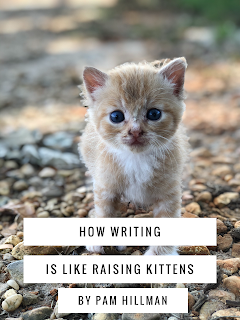 On June 6th, life threw another little kink into my plans.
On June 6th, life threw another little kink into my plans.Three kinks, to be exact.
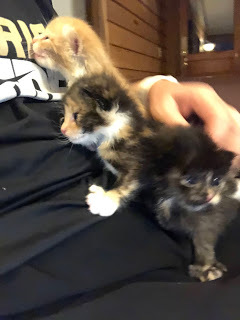 Day 1. They would not be still.
Day 1. They would not be still.I’d spent the night at my mother’s house on Friday night (she’s been sick), then did a bit of cleaning on Saturday morning. My husband called about noon to ask what my mom’s kittens looked. Someone found a kitten on our driveway and he thought one of the kittens from my mom’s had somehow gotten in my car and jumped out on our driveway. But the kitten wasn’t gray, and all of mom’s were accounted for. So, I didn’t think anything else about it.
Two hours later, I headed home. It was really, really hot and I had my windows down, something I rarely do, but I’d been cleaning so was already hot and sweaty. As I turned down my long driveway, I heard meowing. Kittens? Really?
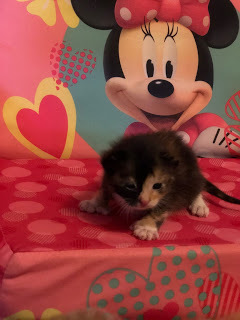
I stopped and got out to find three little balls of fur huddled under an old metal sideboard leaning against the fence. Well, one of them (I called him Wildman, but was overruled by the granddaughter later) wasn’t huddled. He (or she… still not sure), was barreling toward the driveway at full-speed, determined to find food for them all. There were two calicos and an orange tabby, and they were cute as could be, but SO hungry.
I’m pretty sure I’ve seen the mama, a calico, roaming around our hay barn, but it was obvious something had happened to her. The kittens had been taken care of up until that point, but they weren’t going to survive much longer without milk. I took them home and turns out there were FOUR in all. The neighbor had taken one calico home with him, and the next day another neighbor came and got a second one, leaving me with two to raise.
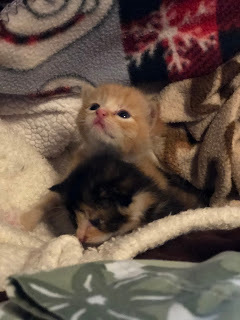 Mimi & Cha-Cha
Mimi & Cha-ChaI estimated them to be 3-4 weeks old, but now I’ve downgraded that to more like 2-3 weeks from when I found them.
So, what does this have to do with writing?
I could write this from what I’ve learned during the last three weeks or what the kittens have learned and how it relates to our writing journey… or I could do it from both perspectives. Let’s see how that goes. I mean, it’s always good to hear both sides, yes?
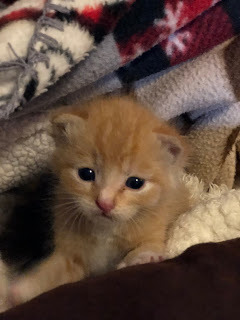 Cha-Cha (It's possible Cha-Cha is a boy.... hmmm)
Cha-Cha (It's possible Cha-Cha is a boy.... hmmm)1) Clawing Our Way Up. When I found these kittens, they were starving for milk. They were loud and clawing their way up me, trying to suckle my chin. I didn’t have any pet-ag bottles, so used a dropper to get a bit of milk and rice water (I was desperate) in their stomachs. It didn’t help much. They were still screaming. I was a basket case and my husband was worse. He said they were not staying in the house. I searched the internet and found a recipe to make kitten formula and made two trips to town to get (human) baby bottles and the ingredients for a diy kitten formula. Since it was the weekend (isn’t it always?), I didn’t think I’d find any pet stores or veterinarians open that might have bottles small enough for their little mouths. For 48 hours, I donned the same milk-covered clothes and fed all three kittens with a baby bottle, then cleaned them up (use your imagination) and repeated the process every 3-4 hours.
Now, isn’t that the way we were when we first started on this writing journey? We were desperate to learn the craft. We sometimes clawed our way up the ladder of learning one rung at a time, trying to find what worked for us, what would help us grow and learn and satisfy us, right?
 The Best-Ever Kitten Sitter (and Namer)
The Best-Ever Kitten Sitter (and Namer)And along comes someone or something that helped us along that journey, giving us a bottle, yes? For me, the Seekers played a big part in that. ACFW has, too. Early on, before ACFW, RWA was a part of my learning curve. Contest, editors, and agents’ feedback all helped me to grow as a writer.
2) Figuring out the BOTTLE. Oh Lord, this was a challenge for my two kittens. I ended up with a calico and an orange tabby. After naming and discarding names for about a week, my four-year-old granddaughter finally dubbed them Mimi and Cha-Cha. Those names seem to have stuck. For now. Mimi, the Calico, is a dainty little eater. She still isn’t much interested in the kitten kibble (wet or dry), but can suck a bottle down in two minutes flat! Cha-Cha, on the other hand, FIGHTS the bottle like a wildcat, mostly because he (I really think Cha-Cha is a boy), isn’t getting it fast enough. If he’d just quit fighting and suck like Mimi, he’d have better luck. OTOH, he already knows where the dry kibble is and eats it at will. She isn’t the least bit interested in the dry kibble.
 2nd Best Kitten Sitter
2nd Best Kitten SitterWho can relate? Oh, there’s so much to talk about here!! :) Mimi would be the plotter, I think. She’d carefully figure out the easiest path from A-Z and methodically set out to accomplish her goal. In her case, it’s lay back in my arms and slurp down a bottle. For Cha-Cha, it’s like… pounce on the bottle, scratch and claw Pammy to death and see what sticks. Find the dry kibble and chomp, chomp, chomp with his face buried in it. But for the record, they’re both growing. They both weigh about the same. Neither system is any better than the other. Be ye plotter or panster… you’ll get there in the end.
3) Litter box. I’m not sure how to relate the litter box to writing. Maybe I should just leave this one blank and let you draw your own conclusions. Ha! Maybe there’s a lot of stinky stuff that goes with writing, but if you get the right kind of litter, it’s not so bad, really. :)
Mimi and Cha-Cha have done amazingly well with the litter box. As someone who’s never had an indoor cat, I’m quite proud of myself for THEIR accomplishment.
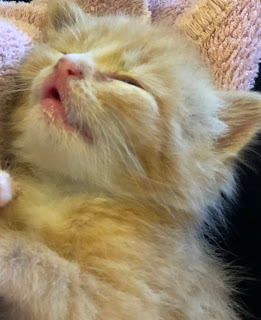 Cha-Cha in a Milk Coma
Cha-Cha in a Milk Coma4) Growing too big for their britches. As Mimi and Cha-Cha have grown, they’ve also become more aggressive. I have plenty of scratch marks where they’ve fought for the bottle. I use a towel to wrap them up while feeding, and can only feed one at a time. Occasionally, I’ve managed both, but it’s easier to just do one. (Hmmm, some of you have written more than one manuscript at once, yes?) My granddaughter SO wanted to give them their bottle, but she realized right quick that they were way too aggressive. Instead, she entertains one while I feed the other one. If they just realized that I have the bottle right there. It’s full of warm milk, and it’s not going anywhere.
Of all the things I’ve said here… very loosely comparing raising these kittens to a writing journey, this point might be the most far-fetched, but possibly the deepest, most serious thing to ponder this weekend. We.Depend.On.Each.Other. We all learn from others. We glean from those who’ve gone before. And, if we’re a little further along the path, we can hold out a hand to those coming up behind us. So, when I feel myself belittling any group, individual, publisher or agency because I don’t think they’re doing anything for “me”, I need to sit back and realize that somewhere along the way, they have helped me. Who am I to turn up my nose and walk away like a disdainful cat?
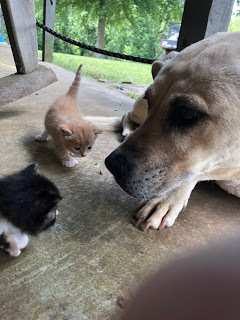 Meeting Dakota
Meeting DakotaI just got a visual of myself wrestling with my WIP. Can I get an amen on that, too???
5) Sassy. On the heels of all this wrestling and fighting with the bottle, they’re getting bolder and more sassy. They’re climbing and playing and becoming more confident. They’re tumbling off of couches and exploring outside. Broadening their horizons. There are pitfalls, of course. The big, bad dog is outside. We don’t know how she’s going to react to them long-term. So far, so good, but what about when my back is turned? The kittens don’t know to be wary, but I do…
Yep, we have to venture out. We have to write our masterpieces and send them out into the world. We have to be bold. Be brave. Realize that it’s a big world out there and we’re more than up to the task of conquering it. And when we take a tumble, we have to get right back up and have another go at it.
6) Independence. Someday (soon), these kittens will be independent of me. I never planned on having indoor cats, and right at this moment, I still don’t plan to. If they become bosom buddies with our outside dog, they’ll be outside cats, but for now, they’re inside. Once they’re grown, they’ll turn into aloof felines that will hardly acknowledge my existence anyway, except for letting me rub behind their ears on occasion, and a plaintive meow when they want me to replenish their kibble.
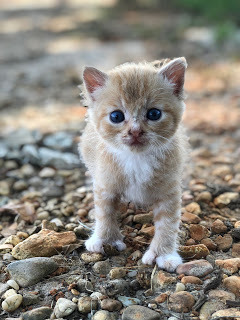 Cha-Cha
Cha-Cha Mimi
MimiIndependence. Maturity. Adulting. Yep. That’s what we should be striving for. Moving from having someone bottle-feed us every little step of the way to accomplishing our writing goals to being competent to do it ourselves.
But it’s okay to allow someone to refill the kibble bowl on occasion.
 CBA Bestselling author PAM HILLMAN was born and raised on a dairy farm in Mississippi and spent her teenage years perched on the seat of a tractor raking hay. In those days, her daddy couldn't afford two cab tractors with air conditioning and a radio, so Pam drove an Allis Chalmers 110. Even when her daddy asked her if she wanted to bale hay, she told him she didn't mind raking. Raking hay doesn't take much thought so Pam spent her time working on her tan and making up stories in her head. Now, that's the kind of life every girl should dream of. www.pamhillman.com
CBA Bestselling author PAM HILLMAN was born and raised on a dairy farm in Mississippi and spent her teenage years perched on the seat of a tractor raking hay. In those days, her daddy couldn't afford two cab tractors with air conditioning and a radio, so Pam drove an Allis Chalmers 110. Even when her daddy asked her if she wanted to bale hay, she told him she didn't mind raking. Raking hay doesn't take much thought so Pam spent her time working on her tan and making up stories in her head. Now, that's the kind of life every girl should dream of. www.pamhillman.com Click HERE to grab your copy starting July 1st
Click HERE to grab your copy starting July 1st
Published on June 25, 2020 21:00
June 23, 2020
Concentration and Procrastination in the End Times
Okay, so maybe 2020 isn't really the End Times, but there have certainly been times this year that it felt like it. How many times have you seen someone comment about just one more thing that 2020 is throwing at us?
Another common theme is that people say they just can't focus, can't concentrate, haven't accomplished anything.
If you're feeling that way, you're not alone.
According to an article in The New Statesman:
Before I go on, I just want to acknowledge that your experience of this pandemic may vary widely according to where you live and how you life has been impacted. I live in NYC which for the past three months was the country's epicenter. We've had close to 400,000 cases and over 24,000 deaths. That kind of thing plays games with your mind - literally. But we'll get to that.
Almost exactly one year ago today, I wrote a post for Seekerville called A 15 Letter Word Not Equal to Lazy. I was reminded of that post this week when I stumbled upon this article - There's a reason we procrastinate and it's not laziness.
I immediately started to read the article because the title struck a chord. I know I have a tendency to procrastinate, but it's been really bad lately. I have a book coming out in January and that seems like so very far away. But that book is done. How do I concentrate on writing a new one when I have no idea what kind of world will even exist for it to be released into? That kind of insidious thinking can be paralyzing, and it definitely fosters procrastination.
So I read the article.
As I began to read, it felt familiar. That's when I realized the person being interviewed, Dr. Pychyl, was the same man I'd read about when writing that Seekerville post a year ago. This man has made the study of procrastination his life's work. He has spent twenty years studying it and leads a procrastination research group at Carleton University. He has a book called S olving the Procrastination Puzzle: A Concise Guide to Strategies for Change.
This article was focused on how the pandemic has affected us.
Indeed, according to research Dr. Amy Arnsten, a Professor of Neuroscience and a Professor of Psychology at Yale University, our inability to focus is actually a biological response to stress.
This is where I got really interested and went all Science Geeky. Apparently it goes back to our prehistoric survival days. I highly recommend you read the whole article, but I'll summarize her main point. The pre-frontal cortex of our brain is where we do all our critical thinking, control impulses, and ... focus. But the pre-frontal cortex is also programmed to weaken under stress so our primitive survival instincts take over.
And that's exactly where we are now, and why concentrating is so difficult.
So what do we do? We can't just give up and wait til someone comes up with a vaccine or a cure.
Dr. Pychyl's answer is very simple - just start. But start small.
Dr. Arnsten suggests you cut yourself some slack and feel reassured that this is a perfectly normal reaction and at some point it will get better. “I think that’s really helpful to have that kind of perspective and gain that sense of control,” she says.
So let's talk. Does it help you to know that you're not alone and that there is a perfectly reasonable biological explanation?
How are you coping?
Prayer helps. Some people do mindfulness or meditation. My daughter has taken up yoga.
For me, I'm trying the combination approach - starting with prayer, and then getting started - with the understanding that it may be tough, but if I do something I'll feel better than if I just waste away time. I was reminded recently about the Biblical admonitions against sloth. I'll take that to heart too - no time for idle hands.
But perhaps the best reward, because we are writers, is that our story world can take us away. There, we are in control. There we make the decisions; we have the power.
And that may give the affirmation we so desperately need.
Remember the Calgon, Take Me Away ads?
So, go write today! And let's hear how it worked for you.
But if you''re procrastinating and are willing to hang around, let's chat. Let's talk about your experiences, and let's try to work our way back to productivity.
Another common theme is that people say they just can't focus, can't concentrate, haven't accomplished anything.
If you're feeling that way, you're not alone.
According to an article in The New Statesman:
"Since February, there has been a 300 per cent increase in people searching “how to get your brain to focus”, an 110 per cent increase in “how to focus better”, and 60 per cent rise in “how to increase focus”. People are paying for apps and services to help their concentration."
Before I go on, I just want to acknowledge that your experience of this pandemic may vary widely according to where you live and how you life has been impacted. I live in NYC which for the past three months was the country's epicenter. We've had close to 400,000 cases and over 24,000 deaths. That kind of thing plays games with your mind - literally. But we'll get to that.
Almost exactly one year ago today, I wrote a post for Seekerville called A 15 Letter Word Not Equal to Lazy. I was reminded of that post this week when I stumbled upon this article - There's a reason we procrastinate and it's not laziness.
I immediately started to read the article because the title struck a chord. I know I have a tendency to procrastinate, but it's been really bad lately. I have a book coming out in January and that seems like so very far away. But that book is done. How do I concentrate on writing a new one when I have no idea what kind of world will even exist for it to be released into? That kind of insidious thinking can be paralyzing, and it definitely fosters procrastination.
So I read the article.
As I began to read, it felt familiar. That's when I realized the person being interviewed, Dr. Pychyl, was the same man I'd read about when writing that Seekerville post a year ago. This man has made the study of procrastination his life's work. He has spent twenty years studying it and leads a procrastination research group at Carleton University. He has a book called S olving the Procrastination Puzzle: A Concise Guide to Strategies for Change.
This article was focused on how the pandemic has affected us.
"We are in a time when uncertainty, worry and anxiety are dominating us emotionally. We are inevitably going to end up delaying things, but if we only have one word for that delay, which is procrastination, we end up beating ourselves up for it." He goes on to disagree, saying, "I would argue that yes, many things are being delayed, but we need a lot of self-compassion right now. We don't need to impugn ourselves with this notion of procrastination."
Indeed, according to research Dr. Amy Arnsten, a Professor of Neuroscience and a Professor of Psychology at Yale University, our inability to focus is actually a biological response to stress.
This is where I got really interested and went all Science Geeky. Apparently it goes back to our prehistoric survival days. I highly recommend you read the whole article, but I'll summarize her main point. The pre-frontal cortex of our brain is where we do all our critical thinking, control impulses, and ... focus. But the pre-frontal cortex is also programmed to weaken under stress so our primitive survival instincts take over.
"So essentially, when faced with immediate physical danger, your prefrontal cortex shuts down to make way for the more primitive parts of your brain – the parts that can respond quickly and basically in order to protect you."
And that's exactly where we are now, and why concentrating is so difficult.
"Arnsten says there are three major factors that make Covid-19 particularly potent for cutting off our prefrontal cortex: its invisibility; the lack of individual control we have over it; and being forced to go against our normal habits in order to protect ourselves."
So what do we do? We can't just give up and wait til someone comes up with a vaccine or a cure.
Dr. Pychyl's answer is very simple - just start. But start small.
"Here's the magic — the next time you face a task that your whole body is screaming, "I don't want to, I don't feel like it," ask yourself: what's the next action? What's the next action I'd need to take to make some progress? Don't break the whole task down. That will be sure to overwhelm you. I think if most of us broke our whole task down, we'd realize that life's too short, you can never get it all done. Instead just say, "What's the next action?" and keep that action as small and as concrete as possible."
Dr. Arnsten suggests you cut yourself some slack and feel reassured that this is a perfectly normal reaction and at some point it will get better. “I think that’s really helpful to have that kind of perspective and gain that sense of control,” she says.
So let's talk. Does it help you to know that you're not alone and that there is a perfectly reasonable biological explanation?
How are you coping?
Prayer helps. Some people do mindfulness or meditation. My daughter has taken up yoga.
For me, I'm trying the combination approach - starting with prayer, and then getting started - with the understanding that it may be tough, but if I do something I'll feel better than if I just waste away time. I was reminded recently about the Biblical admonitions against sloth. I'll take that to heart too - no time for idle hands.
But perhaps the best reward, because we are writers, is that our story world can take us away. There, we are in control. There we make the decisions; we have the power.
And that may give the affirmation we so desperately need.
Remember the Calgon, Take Me Away ads?
So, go write today! And let's hear how it worked for you.
But if you''re procrastinating and are willing to hang around, let's chat. Let's talk about your experiences, and let's try to work our way back to productivity.
Published on June 23, 2020 21:00
June 21, 2020
Rejection Letters, The Good and the Bad
Erica here with you today. We're going back to basics and talking about...

Rejection Letters.
If you're not familiar (you lucky duck) a rejection letter is a missive received from an agent or editor that declines your submission. This letter can arrive just about any time in the process. After your query letter, after your proposal, after the full manuscript is submitted, after your novel goes to the publication board.
But did you know that a rejection letter, or as I like to think of it, a professional decline, isn't always an automatic slam of a door in your face. There are actually several different kinds of rejection letters, and they often follow the progression of a writer's career. You can evaluate your growth and refinement as a writer by the type of rejection letter you're getting.
So, what are some of the types of Rejection Letters, and how can we evaluate them?
The "Void of Silence."The "No Thank You."The "Not For Me."The "Not This One, But..."The "Revise And Resubmit"
The first is The Void of Silence. You submit your query letter (Ruthy covered the ins and outs of query letters in her blog post from Wednesday, June 10th, 2020.) and you wait, and wait, and wait. But Mr. Agent or Ms. Editor does not reply.
You can assume that after a period of time (It varies depending upon who you submitted to, but most agencies will list their response time on their website.) that the answer to your query is no.
Agents receive dozens of submissions every day, and they don't have time to answer each one. If they tried, they would never get anything else done. So no news is most likely just 'no.'
*Some authors will send a polite email after the response time has lapsed, just to check in. It's up to you, but for a simple query letter, I would move on to another agent. If it's after you've submitted a requested full manuscript, I would check in because the agent showed interest initially, and perhaps they haven't had a chance to read your ms just yet.

Some Agencies have a form letter that goes out that says "No, Thank You." It's polite, formal, and generic. The letter goes something like, "Thank you for submitting your query. I will not be pursuing representing this work. All the best."
Not exactly words to warm your heart, but better than nothing. :)
The third type of Rejection Letter is the "Not For Me." This one, while still not giving you warm fuzzies, feels better to receive because it's personalized. The agent or editor takes the time to tell you that your work isn't bad, it just isn't a good fit.
"Dear Writer, thank you so much for contacting me about your project. While I love the premise, I don't feel this story is a good fit for my agency at this time. I wish you all the best placing this book, and I hope I get a chance to read it once it's published."
Better, right? There could be a variety of reasons why your story isn't a good fit for the agent. It might be a bit of oversight on your part, not researching thoroughly and subsequently submitting a project to an agent who doesn't represent that genre. Or it might be that the agent does represent your genre, but she has several authors signed that also write your type of book. Rather than sign another one who will compete with her established clients, she will pass. It might also be that she doesn't have the contacts in the industry that she would need in order to sell your project. Agents build relationships with editors and publishing houses, and if you've written a niche novel, he or she may not have the specific relationships that your story will need. An agent might also have a full list, or a list that is fairly full of debut novelists that he's trying to place. Debut novelists require a lot of work, and if an agent has too many on their list, they can't devote enough time that each one will need.

Another type of Rejection Letter is the "Not this one, but..." This is an exciting one to receive. It means the agent really likes your writing voice or style, he's just not enamored of this particular story. He's asking you what else have you written? Perhaps you might have something that is a better fit in your files.
Reason to celebrate! And a very good reason not to fixate upon one story/book and keep writing new things. You want to have several projects, just in case an agent or editor asks for them.
The last type of Rejection Letter we'll talk about today is: "Revise and Resubmit." This one should have you nearly giddy. This means the story caught the agent's attention, and she would like you to revise the story (the agent will provide you with the information on where she thinks the story went wrong, needs strengthening, or needs an adjustment to be suitable for your target publishers/readers/the market.) and to send the story back once you've made the changes.
While and agent would not ask you to rewrite something she didn't feel really needed a rewrite, this is also a bit of a test on the part of the agent. Will you be open to critiques and editing, and will you follow through. Will you be a good client to work with?
I can't tell you how many authors I've spoken with who get an invitation to revise and resubmit, and they NEVER DO IT! What???
Don't let this be you. If you've made it all the way to the stage of being asked to revise and resubmit, then for the love of rugby (Which I LOVE a lot!) do it .
Now, I'm not saying that every author follows the path of these rejection letters perfectly. You may skip a level, or two, or three. You may, like P.D. James, never get a rejection letter. If that's the case, many blessings upon you, this post isn't written for you. But, if you're like most authors, you'll garner your fair share of rejections along the way before you land that elusive and joy-inducing YES from an agent or editor.
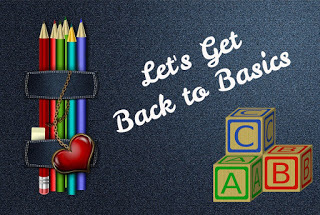
I've received plenty of rejection letters over the years. Even after I was a published author.
1. I have waited on the edge of the abyss, where nothing but heartbreaking silence greeted me.2. I got a rejection once that said, "I hate romances, and prairie romances are the worst." (From an editor at a publishing house that put out lots of romances and prairie romances at that!) That's all the rejection said. OUCH! 3. I got a rejection once from an agent who chided me for not including a SASE with my submission. (Back when we sent everything snail mail printed out on precious paper and included a self-addressed-stamped-envelope in which the agent could slip a form letter or an "I wanna see more" note.) A week later, I got--in the SASE I HAD provided--a request from that same agency for the full manuscript. (Which was subsequently rejected with a polite No Thank You.)4. I've gotten Revise and Resubmit requests, have done the work, only to have the publishing house reject the work at pub board. 5. I've gotten the "This isn't right for us, but what else can you come up with" rejection that led to signing a contract for a new book.
I guess the moral of the story here is, don't give up, but don't fail to pay attention. You can gauge where you are in your writing journey by the types of feedback you're getting. Consider rejection letters as feedback, evaluate it, learn from it, get better because of it, and write some more!
How do you handle rejection letters?
 Best-selling, award-winning author Erica Vetsch loves Jesus, history, romance, and sports. She’s a transplanted Kansan now living in Minnesota, and she is married to her total opposite and soul mate! When she’s not writing fiction, she’s planning her next trip to a history museum and cheering on her Kansas Jayhawks and New Zealand All Blacks. You can connect with her at her website, www.ericavetsch.com where you can read about her books and sign up for her newsletter, and you can find her online at https://www.facebook.com/EricaVetschAuthor/ where she spends way too much time!
Best-selling, award-winning author Erica Vetsch loves Jesus, history, romance, and sports. She’s a transplanted Kansan now living in Minnesota, and she is married to her total opposite and soul mate! When she’s not writing fiction, she’s planning her next trip to a history museum and cheering on her Kansas Jayhawks and New Zealand All Blacks. You can connect with her at her website, www.ericavetsch.com where you can read about her books and sign up for her newsletter, and you can find her online at https://www.facebook.com/EricaVetschAuthor/ where she spends way too much time!
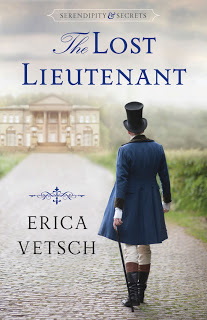
You can Order The Lost Lieutenant at: https://amzn.to/32NYANi and pre-order The Gentleman Spy at https://amzn.to/2qOjkHD
About The Lost Lieutenant:
He's doing what he can to save the Prince Regent's life . . . but can he save his new marriage as well?
Evan Eldridge never meant to be a war hero--he just wanted to fight Napoleon for the future of his country. And he certainly didn't think that saving the life of a peer would mean being made the Earl of Whitelock. But when the life you save is dear to the Prince Regent, things can change in a hurry.
Now Evan has a new title, a manor house in shambles, and a stranger for a bride, all thrust upon him by a grateful ruler. What he doesn't have are all his memories. Traumatized as a result of his wounds and bravery on the battlefield, Evan knows there's something he can't quite remember. It's important, dangerous--and if he doesn't recall it in time, will jeopardize not only his marriage but someone's very life.
*I may be a bit slow to respond to comments today. I beg your indulgence. I'm getting new carpet installed and the house is at sixes and sevens at the moment. I'll jump in when I can, so don't let that stop you from joining in on the conversation!

Rejection Letters.
If you're not familiar (you lucky duck) a rejection letter is a missive received from an agent or editor that declines your submission. This letter can arrive just about any time in the process. After your query letter, after your proposal, after the full manuscript is submitted, after your novel goes to the publication board.
But did you know that a rejection letter, or as I like to think of it, a professional decline, isn't always an automatic slam of a door in your face. There are actually several different kinds of rejection letters, and they often follow the progression of a writer's career. You can evaluate your growth and refinement as a writer by the type of rejection letter you're getting.
So, what are some of the types of Rejection Letters, and how can we evaluate them?
The "Void of Silence."The "No Thank You."The "Not For Me."The "Not This One, But..."The "Revise And Resubmit"
The first is The Void of Silence. You submit your query letter (Ruthy covered the ins and outs of query letters in her blog post from Wednesday, June 10th, 2020.) and you wait, and wait, and wait. But Mr. Agent or Ms. Editor does not reply.
You can assume that after a period of time (It varies depending upon who you submitted to, but most agencies will list their response time on their website.) that the answer to your query is no.
Agents receive dozens of submissions every day, and they don't have time to answer each one. If they tried, they would never get anything else done. So no news is most likely just 'no.'
*Some authors will send a polite email after the response time has lapsed, just to check in. It's up to you, but for a simple query letter, I would move on to another agent. If it's after you've submitted a requested full manuscript, I would check in because the agent showed interest initially, and perhaps they haven't had a chance to read your ms just yet.

Some Agencies have a form letter that goes out that says "No, Thank You." It's polite, formal, and generic. The letter goes something like, "Thank you for submitting your query. I will not be pursuing representing this work. All the best."
Not exactly words to warm your heart, but better than nothing. :)
The third type of Rejection Letter is the "Not For Me." This one, while still not giving you warm fuzzies, feels better to receive because it's personalized. The agent or editor takes the time to tell you that your work isn't bad, it just isn't a good fit.
"Dear Writer, thank you so much for contacting me about your project. While I love the premise, I don't feel this story is a good fit for my agency at this time. I wish you all the best placing this book, and I hope I get a chance to read it once it's published."
Better, right? There could be a variety of reasons why your story isn't a good fit for the agent. It might be a bit of oversight on your part, not researching thoroughly and subsequently submitting a project to an agent who doesn't represent that genre. Or it might be that the agent does represent your genre, but she has several authors signed that also write your type of book. Rather than sign another one who will compete with her established clients, she will pass. It might also be that she doesn't have the contacts in the industry that she would need in order to sell your project. Agents build relationships with editors and publishing houses, and if you've written a niche novel, he or she may not have the specific relationships that your story will need. An agent might also have a full list, or a list that is fairly full of debut novelists that he's trying to place. Debut novelists require a lot of work, and if an agent has too many on their list, they can't devote enough time that each one will need.

Another type of Rejection Letter is the "Not this one, but..." This is an exciting one to receive. It means the agent really likes your writing voice or style, he's just not enamored of this particular story. He's asking you what else have you written? Perhaps you might have something that is a better fit in your files.
Reason to celebrate! And a very good reason not to fixate upon one story/book and keep writing new things. You want to have several projects, just in case an agent or editor asks for them.
The last type of Rejection Letter we'll talk about today is: "Revise and Resubmit." This one should have you nearly giddy. This means the story caught the agent's attention, and she would like you to revise the story (the agent will provide you with the information on where she thinks the story went wrong, needs strengthening, or needs an adjustment to be suitable for your target publishers/readers/the market.) and to send the story back once you've made the changes.
While and agent would not ask you to rewrite something she didn't feel really needed a rewrite, this is also a bit of a test on the part of the agent. Will you be open to critiques and editing, and will you follow through. Will you be a good client to work with?
I can't tell you how many authors I've spoken with who get an invitation to revise and resubmit, and they NEVER DO IT! What???
Don't let this be you. If you've made it all the way to the stage of being asked to revise and resubmit, then for the love of rugby (Which I LOVE a lot!) do it .
Now, I'm not saying that every author follows the path of these rejection letters perfectly. You may skip a level, or two, or three. You may, like P.D. James, never get a rejection letter. If that's the case, many blessings upon you, this post isn't written for you. But, if you're like most authors, you'll garner your fair share of rejections along the way before you land that elusive and joy-inducing YES from an agent or editor.

I've received plenty of rejection letters over the years. Even after I was a published author.
1. I have waited on the edge of the abyss, where nothing but heartbreaking silence greeted me.2. I got a rejection once that said, "I hate romances, and prairie romances are the worst." (From an editor at a publishing house that put out lots of romances and prairie romances at that!) That's all the rejection said. OUCH! 3. I got a rejection once from an agent who chided me for not including a SASE with my submission. (Back when we sent everything snail mail printed out on precious paper and included a self-addressed-stamped-envelope in which the agent could slip a form letter or an "I wanna see more" note.) A week later, I got--in the SASE I HAD provided--a request from that same agency for the full manuscript. (Which was subsequently rejected with a polite No Thank You.)4. I've gotten Revise and Resubmit requests, have done the work, only to have the publishing house reject the work at pub board. 5. I've gotten the "This isn't right for us, but what else can you come up with" rejection that led to signing a contract for a new book.
I guess the moral of the story here is, don't give up, but don't fail to pay attention. You can gauge where you are in your writing journey by the types of feedback you're getting. Consider rejection letters as feedback, evaluate it, learn from it, get better because of it, and write some more!
How do you handle rejection letters?
 Best-selling, award-winning author Erica Vetsch loves Jesus, history, romance, and sports. She’s a transplanted Kansan now living in Minnesota, and she is married to her total opposite and soul mate! When she’s not writing fiction, she’s planning her next trip to a history museum and cheering on her Kansas Jayhawks and New Zealand All Blacks. You can connect with her at her website, www.ericavetsch.com where you can read about her books and sign up for her newsletter, and you can find her online at https://www.facebook.com/EricaVetschAuthor/ where she spends way too much time!
Best-selling, award-winning author Erica Vetsch loves Jesus, history, romance, and sports. She’s a transplanted Kansan now living in Minnesota, and she is married to her total opposite and soul mate! When she’s not writing fiction, she’s planning her next trip to a history museum and cheering on her Kansas Jayhawks and New Zealand All Blacks. You can connect with her at her website, www.ericavetsch.com where you can read about her books and sign up for her newsletter, and you can find her online at https://www.facebook.com/EricaVetschAuthor/ where she spends way too much time!
You can Order The Lost Lieutenant at: https://amzn.to/32NYANi and pre-order The Gentleman Spy at https://amzn.to/2qOjkHD
About The Lost Lieutenant:
He's doing what he can to save the Prince Regent's life . . . but can he save his new marriage as well?
Evan Eldridge never meant to be a war hero--he just wanted to fight Napoleon for the future of his country. And he certainly didn't think that saving the life of a peer would mean being made the Earl of Whitelock. But when the life you save is dear to the Prince Regent, things can change in a hurry.
Now Evan has a new title, a manor house in shambles, and a stranger for a bride, all thrust upon him by a grateful ruler. What he doesn't have are all his memories. Traumatized as a result of his wounds and bravery on the battlefield, Evan knows there's something he can't quite remember. It's important, dangerous--and if he doesn't recall it in time, will jeopardize not only his marriage but someone's very life.
*I may be a bit slow to respond to comments today. I beg your indulgence. I'm getting new carpet installed and the house is at sixes and sevens at the moment. I'll jump in when I can, so don't let that stop you from joining in on the conversation!
Published on June 21, 2020 21:00
June 20, 2020
Sunday Scripture & Prayer Requests
HAPPY FATHER'S DAY
 The Exhortation to the Apostles, James Tissot, 1886-1894,
The Exhortation to the Apostles, James Tissot, 1886-1894,
Brooklyn Museum, [PD-US]
Jesus said to the Twelve:
“Fear no one.
Nothing is concealed that will not be revealed,
nor secret that will not be known.
What I say to you in the darkness, speak in the light;
what you hear whispered, proclaim on the housetops.
And do not be afraid of those who kill the body but cannot kill the soul;
rather, be afraid of the one who can destroy
both soul and body in Gehenna.
Are not two sparrows sold for a small coin?
Yet not one of them falls to the ground without your Father’s knowledge.
Even all the hairs of your head are counted.
So do not be afraid; you are worth more than many sparrows.
Everyone who acknowledges me before others
I will acknowledge before my heavenly Father.
But whoever denies me before others,
I will deny before my heavenly Father.”Matthew 10:26-33
Happy Father's Day to all the dads! We're celebrating you today and giving thanksfor your love of family, country and, most of all, the Lord!
The Seekerville bloggers are praying for YOU and for our entire blog community. If you have any special intentions that need additional prayer coverage, leave a request for prayer in the comment section below.
Please join us in praying for the United States--and the world--during this coronavirus outbreak. Also please pray for calm to be restored to our country and for peace to reign.
We are so grateful for all of you—for your friendship and your support! May the Lord bless you and your families and keep you safe.
 The Exhortation to the Apostles, James Tissot, 1886-1894,
The Exhortation to the Apostles, James Tissot, 1886-1894,Brooklyn Museum, [PD-US]
Jesus said to the Twelve:
“Fear no one.
Nothing is concealed that will not be revealed,
nor secret that will not be known.
What I say to you in the darkness, speak in the light;
what you hear whispered, proclaim on the housetops.
And do not be afraid of those who kill the body but cannot kill the soul;
rather, be afraid of the one who can destroy
both soul and body in Gehenna.
Are not two sparrows sold for a small coin?
Yet not one of them falls to the ground without your Father’s knowledge.
Even all the hairs of your head are counted.
So do not be afraid; you are worth more than many sparrows.
Everyone who acknowledges me before others
I will acknowledge before my heavenly Father.
But whoever denies me before others,
I will deny before my heavenly Father.”Matthew 10:26-33
Happy Father's Day to all the dads! We're celebrating you today and giving thanksfor your love of family, country and, most of all, the Lord!
The Seekerville bloggers are praying for YOU and for our entire blog community. If you have any special intentions that need additional prayer coverage, leave a request for prayer in the comment section below.
Please join us in praying for the United States--and the world--during this coronavirus outbreak. Also please pray for calm to be restored to our country and for peace to reign.
We are so grateful for all of you—for your friendship and your support! May the Lord bless you and your families and keep you safe.
Published on June 20, 2020 21:00
June 19, 2020
Weekend Edition

If you are not familiar with our giveaway rules, take a minute to read them here. It keeps us all happy! All winners should send their name, address, and phone number to claim prizes. Note our new email address and please send your emails to Seekerville2@gmail.com

Monday: Ruth Logan Herne opened a discussion over How Much Conflict Is Too Much?
Wednesday: Debby Giusti entertained us with her blog post, "Suspense a la Snoopy!" The winner of the drawing for Debby's Publishers Weekly bestseller, "Dangerous Amish Inheritance," is Wilani Wahl! Congrats, Wilani.
Friday: Winnie Griggs talked about setting the pace of your novel. The winner of their choice of any of Winnie's backlist is Rachel Herod.

Monday: Erica Vetsch is our hostess today. She's talking about Rejection Letters, the Good and the Bad!
Wednesday: Cate Nolan is our hostess today. Friday: Pam Hillman is our hostess today.

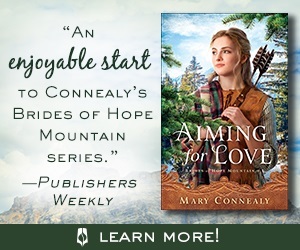 ON SALE NOW for FREE!!!!Aiming for LoveFREE for a limited timeIn all ebook formats
Kindle
Nook
ON SALE NOW for FREE!!!!Aiming for LoveFREE for a limited timeIn all ebook formats
Kindle
Nook

A fun interview with four comedy writers, including Mary Connealy on Bethany House Fiction.

Debby Giusti and Jan Drexlerare included in a FAMILY FICTION pollfeaturing Amish authors. To vote, click HERE!Thanks for your support and your votes!
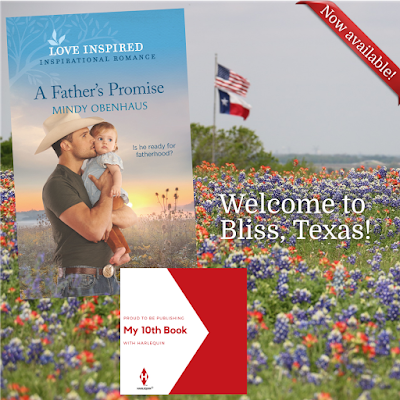 Get your copy here!
Get your copy here!
2020 Genesis Finalists, the unpublished contest for ACFW. Check out the list. https://www.acfw.com/genesis/2020_genesis_contest_finalists
Does Your Story Really Need That Extra POV Character?
by KM Weiland at Helping Writers Become Authors
Harsh Does Not Equal Honest: Pick Your Beta Readers Carefully
by Dario Ciriello at Fiction University
Marketing Your Book From the Heart of Your Brand
by Karen Whiting at The Write Conversation
How To Write an Author Bio
by CS Lakin at The Self Publisher
Three Factors In Success
by Angela Ruth Strong at Learn How To Write A Novel
Team Up! What Makes Writing Groups Work
by The Editors of Writer's Digest
Published on June 19, 2020 21:00
June 18, 2020
Setting The Pace
 Hello everyone, Winnie Griggs here. Today I'd like to discuss story pacing.
Hello everyone, Winnie Griggs here. Today I'd like to discuss story pacing.Before we start, let’s set a baseline by talking about just what we mean by Pacing. Pacing is the rhythm and momentum of your story as choreographed by the action and beats of your chapters, scenes, paragraphs, sentences and even word choices. It directs the ebb and flow of your story, the speed with which your reader moves through the story as well as the speed at which the timeline of your story events unfold.
Effective pacing employs all the available tools at a writer’s disposal to keep your reader intrigued, emotionally engaged, and, most importantly, turning the pages. In fact, pacing is not measured in actions or events, but in the emotional investment your reader has in the unfolding of your story.
Think about pacing in terms of dancing, more specifically square dancing. Square dancing normally brings to mind structure, energy, teamwork and following directions.
Traditional square dancing is made up of about 30 standardized movements referred to as ‘calls’. The caller has the freedom to sequence these calls in a variety of ways and it’s his goal to sequence them in such a way as to create a dance set that both challenges and entertains the participants. If he’s done his job well, the dance will have a pleasing flow for each couple and for the overall group. He does this by giving thought to which calls he will include, what sequence he will arrange them in, and what tempo he will set for each.
In literature, of course, the author plays the role of caller and one of the critical tools she uses to orchestrate the movements of the story is pacing. It’s all about piquing and holding your reader’s interest, about making it a keen ‘page turning’ experience for her. Well-orchestrated pacing strikes a balance between heart-pounding action scenes and the more thoughtful, cerebral scenes and everything in between.
As the author, it’s your job to manipulate time in order to keep the reader engaged. You do this by giving story weight to the moments that deserve them. You compress long periods of time where nothing significant happens into short transitional passages, and taking those moments that are minimal time-wise but are significant in story-weight and really focus in and drill down to wring every ounce of emotion and story progression from them.

As for the mechanics of how to do this, it’s not as mysterious and difficult a task as some think. Sentences that are longer and more complex than normal read much slower than those that are shorter and more clipped. In square dance terms this would be like following an advanced move like a Dixie Grand with the slower and more stately Promenade.
You can also control the pace through the inclusion or exclusion of detail. Passages that are lush with imagery and description slow the reader down as they take time for a reader to visualize and appreciate the picture you are painting. Whereas, in a high octane action scene, your detail is stark and delivered in staccato bursts.
A third method is through the use of dialog and the way in which that dialog is delivered. The energy and emotion of the conversation will seep into the reader, subconsciously adding to the tension or calmness of the pace.
And then, of course, there is the manipulation of story time. As I mentioned earlier, to move the story along, compress all those days and weeks when nothing of significance happens into a short transition. Conversely, take your big payoff scenes and really focus in on them. I’ll talk more about that a little later.
In real life we all enjoy indulging in an occasional change of pace, some excitement injected into our day-to-day routine to jar us out of our boring normalcy, or something soothing to help us relax after a frantically paced day. So it is with our readers.
Most of us have heard that the faster the pace the better, that today’s reader, for the most part has a shorter attention span, a TV-and-internet-induced thirst for rapid fire bursts of information and entertainment.
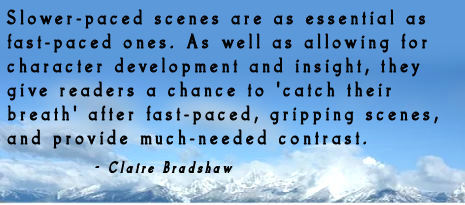
And yes, fast paced is good, but even an action adventure story needs some breathers sprinkled in, some time for the characters - and the reader - to reflect, however briefly, on what is happening around them and to them. These are your reaction scenes, the moments where your character thinks, perhaps licks his wounds, then plots and plans before moving into the next action scene.
Stories have a rhythm that is unique to the genre and to the particular tale you want to tell. If that underlying music is based on one note, no matter how rapid you play it, it becomes monotonous and quickly bores the reader. Varying the notes and the tempo, however, stirs the listeners’ interest, perhaps makes the toes tap and the shoulders and hips move, in effect tugging the listener into the music itself, making them an active participant. In similar fashion, effective pacing draws the reader in, engages them in what is happening on the page and propels them forward through the story. It both builds the tension and allows for moments of slower movement to emphasize important moments, build on emotions and enhance the richness of the overall experience.
There are also certain scenes, even in the fastest paced stories, that have a huge emotional payout for your reader - these are the scenes you most certainly DON’T want to race through, that you want to dig into in order to provide depth and texture and sensory richness.
In a romance novel these scenes would include, among others:· The First meeting/inciting incident· The First Kiss· The first love scene if your book includes one· The realization of being in love (for each the hero and the heroine)· The revelation of the major backstory/motivating event/’big’ secret· The black moment· The happily ever after resolution
These scenes are the heart and soul of your book, the emotional lynchpins that, when structured well, can land a book on many a reader’s keeper shelf. This means that you should take the pains to immerse the reader in whatever emotions are applicable - hope, joy, anguish, poignancy, rage, passion, or a deep and abiding commitment.
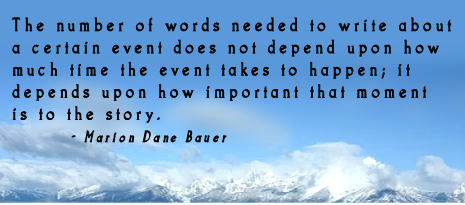
Because these are the scenes your reader eagerly anticipates, she will really appreciate you slowing the pace at these pivotal moments. In fact, make certain you don’t rush through them, or worse yet, transition over them entirely. Take the time to truly focus on the emotions your characters are feeling, as well as those you want your reader to feel (not always the same). To do this you will need to draw on every tool at your disposal, including craft, instinct, finesse, and your writer’s “inner ear”
Again, the key is to get the balance right. If your story is composed of only long thoughtful passages, no matter how evocative or lyrical, your reader will find it much too easy to lose interest and close the book. On the other hand, if it’s all frantic, high-action scenes, then your reader may find it unsettling and confusing and perhaps unbelievable. Non-stop action, in fact, can have a numbing effect, and your scenes will lose much of their impact if there is no change in the pace.
It is the peaks and valleys, the pulse pounding moments at the crests punctuated by emotional breathers on the plains that provide the variety necessary to keep readers from getting bored or complacent. What makes this seem such a maddening task is that striking the right balance between that ebb and flow of your story is different for each and every story we write. The mix of action vs. reaction, the amount of description and detailed world building, the introduction and placement of sub-plots, turning points and major reveals will all vary greatly from story to story. As writers we should seek to direct our words to provide the pacing that is just right for the scene we’re writing, the pacing that will deliver the emotional punch you want the reader to feel.
It’s up to you as the author to figure out what that mix is for the specific story you want to tell. How you do that is based partly on what you’ve learned about the craft of writing and partly on instinct, or, to carry out our dancing metaphor, your own natural rhythm.

Do you have any additional insights or tips when it comes to story pacing? Did any of these points resonate with you? Join in the conversation to be entered in a drawing for reader's choice of any book from my backlist.
Published on June 18, 2020 21:22



